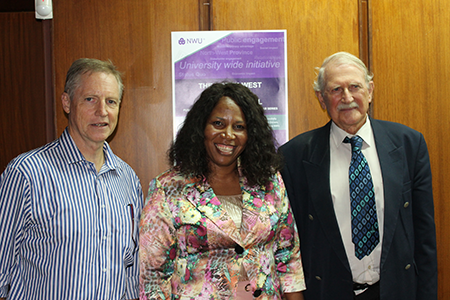South Africa has a shortfall of approximately 60 000 doctors in comparison to its peer countries. The North-West University (NWU) is looking into opening a school of medicine to help bridge this gap and to offer quality healthcare services to community members.
On 23 February NWU Deputy Vice-Chancellor: Research and Innovation Prof Refilwe Phaswana-Mafuya invited members of the public and media to the second public lecture within the NWU Research and Innovation Seminar Series, titled “The NWU Medical School”.
Prof Wieland Gevers, a retired medical expert and Prof Andrew Robinson, an extraordinary professor at the NWU’s Africa Unit for Transdisciplinary Health Research (AUTHeR), were the two keynote speakers at the lecture.
Prof Robinson gave an in-depth presentation about how far the university is with the process of establishing a school of medicine, while Prof Wieland spoke about how the NWU can approach the task of opening such a school.

The NWU recently hosted a public lecture regarding a possible medical school for the university. Here is Prof Andrew Robinson, keynote speaker and extraordinary professor at the NWU’s Africa Unit for Transdisciplinary Health Research, Prof Refilwe Phaswana-Mafuya, the deputy vice-chancellor for research and innovation and Prof Wieland Gevers, also a keynote speaker and retired medical expert.
NWU awaits the go-ahead
According to Prof Robinson, the North West Province has the lowest health professional to population ratio in South Africa with 0,21 doctors for every 1 000 people. He said that a school of medicine that is Afrocentric, decolonised and that has a decentralised Community-Orientated Primary Health Care (COPC) model is needed to alleviate this problem.
Although the NWU is ready, willing and capable of opening a school for health professionals, the university is still waiting for approval from the Department of Higher Education and Training (DHET). “A very detailed business plan and financial model were developed and submitted to the DHET in July 2017,” said Andrew. “However, a number of other processes need to be completed before the NWU can get approval.”
How to train the best to be the best
The proposed school will use the Twin Core-Campus model. The campuses in Potchefstroom and Mahikeng will be the first to offer medical training for medical practitioners, with the campus in Vanderbijlpark to be included at a later stage.
Prof Robinson explained that there is no need for the NWU to build large infrastructure.The Faculty of Health Sciences is well-established on the campuses in Mahikeng and Potchefstroom and the campuses already have the necessary infrastructure and equipment.
He added that prospective students who are interested in a healthcare training at the NWU will have to complete a unique one-year pre-health sciences credit-carrying certificate course. During this course students will work with community health workers using the latest technology which assists medical practitioners to treat, monitor and track diseases.
The school will operate on a clinical training platform that consists of 10 hospitals and their surrounding clinics. The students will be based at these hospitals and clinics and receive support from the NWU’s Digital Clinical Learning Centres.
Opening a school of medicine will be a great advantage not only for the NWU, but also for the North West Province. The NWU looks forward to getting approval from the department and working towards providing top-quality healthcare professionals
See a live stream video of the event below:
